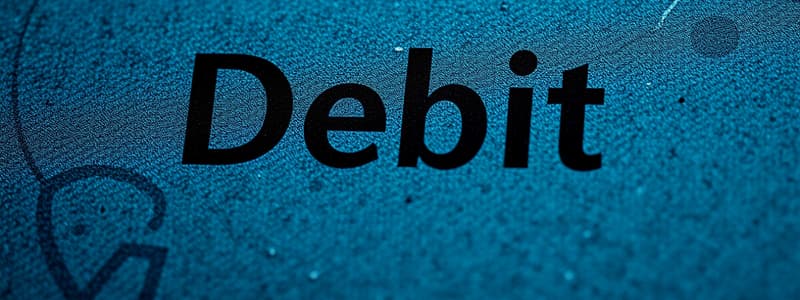Podcast
Questions and Answers
A bounced check is a check returned by a bank due to lack of sufficient funds.
A bounced check is a check returned by a bank due to lack of sufficient funds.
True (A)
The Truth in Lending Act requires lenders to disclose the total cost of credit only after a loan agreement has been made.
The Truth in Lending Act requires lenders to disclose the total cost of credit only after a loan agreement has been made.
False (B)
A replevin case involves recovering property that has been legally obtained by someone else.
A replevin case involves recovering property that has been legally obtained by someone else.
False (B)
Credit is defined as obtaining goods or services with a promise to pay later.
Credit is defined as obtaining goods or services with a promise to pay later.
Republic Act No. 7394 is designed to provide protections against abusive and unfair debt collection practices.
Republic Act No. 7394 is designed to provide protections against abusive and unfair debt collection practices.
Usury law allows for unlimited interest rates on loans.
Usury law allows for unlimited interest rates on loans.
The Credit Information System Act oversees a decentralized credit information system.
The Credit Information System Act oversees a decentralized credit information system.
A secure charge account is a type of consumer credit classification.
A secure charge account is a type of consumer credit classification.
The Philippine Competition Act focuses solely on regulating interest rates within financial markets.
The Philippine Competition Act focuses solely on regulating interest rates within financial markets.
A writ of replevin is a court order seeking the return of wrongfully possessed property.
A writ of replevin is a court order seeking the return of wrongfully possessed property.
Once a property sold in installments has been foreclosed, the mortgagee can pursue the purchaser for remaining unpaid balance.
Once a property sold in installments has been foreclosed, the mortgagee can pursue the purchaser for remaining unpaid balance.
The two installment default rule allows a vendor to cancel the sale after missed payments.
The two installment default rule allows a vendor to cancel the sale after missed payments.
The Philippine Credit Card Industry Regulation Law includes protections against excessive fees and unfair practices.
The Philippine Credit Card Industry Regulation Law includes protections against excessive fees and unfair practices.
Credit functions do not include any social functions.
Credit functions do not include any social functions.
Trade credit is a classification of credit according to use.
Trade credit is a classification of credit according to use.
The court upheld the interest rate at 20% per annum as being reasonable under the circumstances.
The court upheld the interest rate at 20% per annum as being reasonable under the circumstances.
Effective credit control can reduce bad debts.
Effective credit control can reduce bad debts.
The duties of the credit department include setting credit limits.
The duties of the credit department include setting credit limits.
Reliable sources for assessing creditworthiness include only employers and business references.
Reliable sources for assessing creditworthiness include only employers and business references.
The C’s of credit consist of interest rate and loan duration.
The C’s of credit consist of interest rate and loan duration.
Timely reports to upper management can improve credit management.
Timely reports to upper management can improve credit management.
Marital status is considered a factor in evaluating a borrower's credit qualities.
Marital status is considered a factor in evaluating a borrower's credit qualities.
Republic Act No. 8484 regulates the issuance and use of access devices like credit and debit cards.
Republic Act No. 8484 regulates the issuance and use of access devices like credit and debit cards.
The collection of records of amounts owing is not part of the credit department's duties.
The collection of records of amounts owing is not part of the credit department's duties.
The disadvantages of credit trade include the risk of financial prosperity.
The disadvantages of credit trade include the risk of financial prosperity.
Collateral is an irrelevant factor in assessing a borrower's credit.
Collateral is an irrelevant factor in assessing a borrower's credit.
Credit cards are one of the forms of credit mentioned.
Credit cards are one of the forms of credit mentioned.
Length of production process is not a factor that influences credit conditions.
Length of production process is not a factor that influences credit conditions.
Elevated administrative costs are a potential advantage of credit trade.
Elevated administrative costs are a potential advantage of credit trade.
Sending a notice of overdue account is one of the suggested actions for handling overdue accounts.
Sending a notice of overdue account is one of the suggested actions for handling overdue accounts.
Financial position of the business does not affect credit conditions.
Financial position of the business does not affect credit conditions.
Potential loss of peace of mind is identified as an advantage of credit trade.
Potential loss of peace of mind is identified as an advantage of credit trade.
Flashcards are hidden until you start studying
Study Notes
Definition and Nature of Credit
- Derived from Latin creditum, meaning something entrusted to another.
- Represents purchasing power and confidence of creditors in borrowers’ ability to repay.
- Involves obtaining goods or services with a promise of future payment.
Classification of Credit
- Types include charge accounts, secure charge accounts, installment accounts, and straight loans.
- Credit is categorized based on use: consumer credit, industrial credit, and trade credit.
Functions of Credit
- Serves economic, social functions, and promotes business activity.
Usury Law (CA No. 2655)
- Regulates loan interest rates to prevent excessive charges.
- Interest rates are negotiable; however, unreasonable terms are not permissible.
- Reasonable interest rate set at 12% per annum, with an additional 1% monthly as liquidated damages.
Civil Law on Installment Contracts
- Vendor may cancel sale or foreclose chattel mortgage on missed payments.
- Failure to make payments allows vendor specific remedies under Art. 1484, RA 386.
No Deficiency Judgment Rule
- Once an installment property is sold, the mortgagee cannot pursue the purchaser for unpaid balance.
Bouncing Check Law
- Concerns checks returned due to insufficient funds.
- Penalties apply to issuing checks without adequate funds or credit.
Replevin Cases
- Legal action to recover wrongfully taken personal property.
- Requires plaintiff to prove ownership and wrongful possession.
Truth in Lending Act (Republic Act No. 3765)
- Mandates clear disclosure of true credit costs before loan agreements to protect consumers.
Consumer Act of the Philippines (Republic Act No. 7394)
- Encompasses consumer rights and protections.
- Prohibits abusive and misleading debt collection practices.
Credit Information System Act (Republic Act No. 9510)
- Establishes a centralized credit information system by the Credit Information Corporation (CIC).
- Enhances access to credit while providing transparency on borrowers' credit data.
Philippine Credit Card Industry Regulation Law (Republic Act No. 10642)
- Regulates credit card issuance and promotes protections against unfair practices and excessive fees.
Philippine Competition Act (Republic Act No. 10870)
- Encourages fair competition and combats anti-competitive practices affecting credit markets.
Access Devices Regulation Act of 1998 (Republic Act No. 8484)
- Governs the use of access devices like credit and debit cards, ensuring liability for unauthorized transactions.
Credit Policy Guidelines
- Determine terms for credit extension, payment schedules, credit limits, and handling of delinquent accounts.
Advantages and Disadvantages of Credit Trade
- Advantages include immediate access to goods/services.
- Disadvantages involve risks like default, financial insolvency, and increased administrative costs.
Forms of Credit
- Includes suppliers’ credit, credit cards, and various installment and factoring options.
Factors Influencing Credit Conditions
- Consider variables like business nature, financial situation, economic conditions, and competition.
Managing Overdue Accounts
- Use multiple contact attempts for overdue notices; consider legal action if necessary.
Effective Credit Control
- Aims to increase sales and profits while reducing bad debts and fostering customer loyalty.
Sources for Creditworthiness Assessment
- Utilize business and bank references, credit application forms, credit agencies, and chambers of commerce.
Duties of the Credit Department
- Responsibilities include legal actions, setting credit limits, maintaining records, ensuring prompt debt settlements, and regular reporting to management.
C’s of Credit
- Critical factors include character, capacity, capital, collateral, and overall conditions.
Borrower's Credit Qualities
- Key aspects include income, residence, employment, payment records, and collateral availability.
Studying That Suits You
Use AI to generate personalized quizzes and flashcards to suit your learning preferences.




